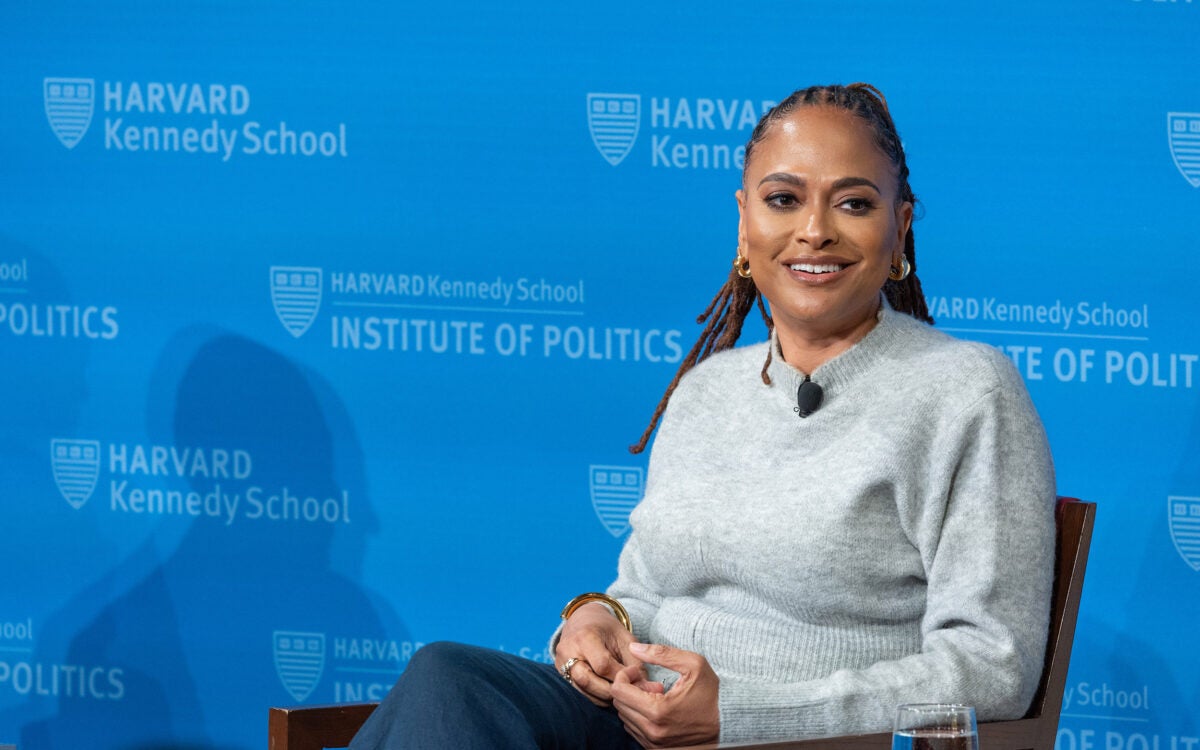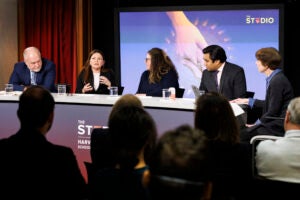Tag: Medicine
-
Nation & World
Robotic radical hysterectomy has advantages
New technologies now allow surgery to be performed with less impact on patient quality of life. As the trend toward minimally invasive surgery grows, robotic-assisted surgery has become an appealing tool for gynecologic oncology surgeons. However, to date, there is little data to confirm the benefits of this technology. New research from Brigham and Women’s…
-
Nation & World
Newsmakers
Alfred Goldberg, cell biology professor at Harvard Medical School (HMS), recently received a $15,000 cash prize as the recipient of the 11th annual Jacob Heskel Gabbay Award for Biotechnology and Medicine from Brandeis University.
-
Nation & World
Dybul urges partnering with governments, communities to fight AIDS
In honor of World AIDS Day (Dec. 1), Ambassador Mark Dybul, the U.S. global AIDS coordinator who is leading the implementation of the $48 billion President’s Emergency Plan for AIDS Relief (PEPFAR), spoke Dec. 4 in Sever Hall.
-
Nation & World
Hailing an unfulfilled promise
Harvard marked the 60th anniversary of the Universal Declaration of Human Rights Wednesday (Dec. 10), highlighting both the document’s power and its unfulfilled promise through theater, song, and ideas.
-
Nation & World
‘The health of poetry’
As a graduate student at Oxford, Gwyneth Lewis wrote her dissertation on 18th century literary forgery. But as a working poet for three decades — and this year as a Radcliffe Fellow — she is as far from that fraud as conceivable.
-
Nation & World
HUHS continues to offer flu vaccination clinics
Harvard University Health Services (HUHS) is conducting free vaccination clinics. The clinics are open to the entire Harvard University community every Monday and Tuesday (noon-3 p.m.) at HUHS on the second floor of the Holyoke Center (Monks Library). Students must have their Harvard ID to receive the vaccination. More information on the flu can be…
-
Nation & World
Cutler finds decline in cancer deaths
Improvements in behavior and screening have contributed greatly to the 13 percent decline in cancer mortality since 1990, with better cancer treatments playing a supporting role, according to new research from David Cutler of Harvard University.
-
Nation & World
Genetic screening no better than traditional risk factors for predicting type 2 diabetes
Screening for a panel of gene variants associated with the risk for type 2 diabetes can identify adults at risk for the disorder but is not significantly better than assessment based on traditional risk factors such as weight, blood pressure, and blood sugar levels.
-
Nation & World
A single gene leads yeast cells to cooperate against threats
An ingenious social behavior that mobilizes yeast cells to cooperate in protecting each other from stress, antibiotics, and other dangers is driven by the activity of a single gene, scientists report this week in the journal Cell. The cooperating cells use the same gene, dubbed FLO1, as a marker for detecting “cheaters,” cells that try…
-
Nation & World
Eleanor and Miles Shore 50th Anniversary Fellowship Program for Scholars in Medicine
The Eleanor and Miles Shore 50th Anniversary Fellowship Program for Scholars in Medicine has announced the selection of more than 90 junior faculty members, researchers, and clinicians as fellows for the 2008-09 academic year. Fellows generally receive between $25,000 and $30,000 for one year.
-
Nation & World
Drug trial shows dramatic reduction in hidden heart disease
A Harvard-led study shows that the risk of heart attack and stroke among subjects with “silent heart disease” — and normal cholesterol levels — can be dramatically reduced by the use of an already widely prescribed class of drugs.
-
Nation & World
Mortimer John Buckley
Mortimer John Buckley was born July 1, 1932 in Worcester, Massachusetts to an Irish immigrant family from near Killarney. Mort attended the College of the Holy Cross and then Boston University Medical School, later being named a distinguished alumnus of both schools.
-
Nation & World
In survey, patients give some high, some low marks to hospitals
The quality of hospitals across the United States is inconsistent. To address this issue, the federal government and private organizations have begun to publicly report data, such as how well hospitals treat certain conditions. But until now, there has been no data on how patients themselves feel about the care they received. A new study…
-
Nation & World
Researchers gain ground in treatment options for disfiguring tumor
A team of researchers led by Harvard School of Dental Medicine (HSDM) Dean for Research Bjorn Olsen has discovered a mechanism for the rapid growth seen in infantile hemangioma, the most common childhood tumor.
-
Nation & World
Joseph J. Schildkraut
For a period during the late 1950s and 1960s, psychiatry attracted some of the most capable graduates of US medical schools. Intrigued by the conceptual interest of psychoanalytic theory, and the possibility of treatment via the couch, these students chose for residency departments of psychiatry that featured grounding in psychoanalysis. One of these was Joe…
-
Nation & World
Gene therapy restores vision to mice with retinal degeneration
Massachusetts General Hospital (MGH) researchers have used gene therapy to restore useful vision to mice with degeneration of the light-sensing retinal rods and cones, a common cause of human blindness. Their report, appearing in the Oct. 14 Proceedings of the National Academy of Sciences, describes the effects of broadly expressing a light-sensitive protein in other…
-
Nation & World
‘Death protein’ may lead to drugs that force cancer cells to self-destruct
Scientists at Dana-Farber Cancer Institute have identified a previously undetected trigger point on a naturally occurring “death protein” that helps the body get rid of unwanted or diseased cells. They say it may be possible to exploit the newly found trigger as a target for designer drugs that would treat cancer by forcing malignant cells…
-
Nation & World
Genome Project releases data on 10 genetic pioneers
The world moved a step deeper into the DNA age Monday (Oct. 20) as 10 volunteers released their genetic and medical information on the Internet as part of a multiyear effort to make genetic data an everyday part of medical care.
-
Nation & World
Researchers identify promising gene target for neuroblastoma therapy
Researchers at Dana-Farber Cancer Institute have identified a set of previously unknown mutations in a single gene in 8 percent of neuroblastomas, tumors of the nervous system that occur in young children and account for approximately 15 percent of all childhood cancer deaths.
-
Nation & World
Cooper: Doctor-patient relations cause health disparities
In the United States, a black man can expect to die, on average, 10 years earlier than his white counterpart. For black women, that racial gap in life expectancy is five years.
-
Nation & World
Star quest knowledge provides new view of ourselves
In a basement laboratory at the Harvard-Smithsonian Center for Astrophysics (CfA), surrounded by instruments built to detect the universe’s distant secrets, sits a machine that will help us look not outward to the stars, but inward at our own bodies.
-
Nation & World
Hansjörg Wyss gives $125M to create institute
Engineer, entrepreneur, and philanthropist Hansjörg Wyss, M.B.A. ’65 has given Harvard University $125 million to create the Hansjörg Wyss Institute for Biologically Inspired Engineering.
-
Nation & World
The pine beetle’s tale: Destructive insect has pharmaceutical potential
Researchers at Harvard Medical School and the University of Wisconsin, Madison, have discovered how beetles and bacteria form a symbiotic and mutualistic relationship — one that ultimately results in the destruction of pine forests. In addition, they’ve identified the specific molecule that drives this whole phenomenon.
-
Nation & World
Technique offers close-ups of electrons and nuclei
Providing a glimpse into the infinitesimal, physicists have found a novel way to spy on some of the universe’s tiniest building blocks. Their “camera,” described this week (Oct. 1) in the journal Nature, consists of a special “flaw” in diamonds that can be manipulated into sensitively monitoring magnetic signals from individual electrons and atomic nuclei…
-
Nation & World
New approach to gene therapy may shrink brain tumors, prevent their spread
Massachusetts General Hospital (MGH) researchers are investigating a new approach to gene therapy for brain tumors — delivering a cancer-fighting gene to normal brain tissue around the tumor to keep it from spreading. An animal study described in the journal Molecular Therapy, the first study to test the feasibility of such an approach, found that…
-
Nation & World
HSPH expands HIV/AIDS work in Tanzania
Nearly 150 years ago, the Tanzanian city of Dar es Salaam was known by another name — Mzizima, meaning “healthy town” in the local language. But over the decades, the city and the country of Tanzania have experienced mounting challenges to that health.
-
Nation & World
Broad Institute gets major grant for epigenomics research
Researchers at the Broad Institute of Harvard and MIT announced Sept. 30 that they have received a grant from the National Institutes of Health (NIH) to map the epigenomes of a variety of medically important cell types, including human embryonic stem cells.
-
Nation & World
HMS/MGH’s Bruce Walker presents update on vaccine progress
Bruce Walker recalls sitting across from a person long-infected with HIV who never took antiretroviral drugs and never developed AIDS. Walker remembers thinking that the person’s body held a secret of which even they were unaware: how to stop the global AIDS pandemic.
-
Nation & World
NIH selects nine Pioneers, Innovators from Harvard
Nine Harvard faculty members are among 47 scientists nationally whose promising and innovative work was recognized Monday (Sept. 22) with the announcement of two grant programs through the National Institutes of Health (NIH).


